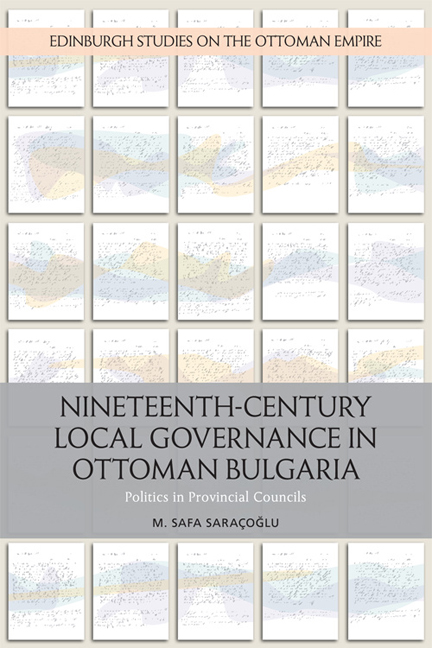Book contents
- Frontmatter
- Contents
- List of Maps, Figures and Tables
- Abbreviations
- Preface
- Map
- 1 Introduction
- 2 Contextualising the Nineteenth Century
- 3 Sitting Together: Local Councils and the Politics of Election in the County of Vidin
- 4 Once Inside the Chamber . . . Participation in the Politics of Local Administration
- 5 Writing Politics: Ottoman Governmentality and the Language of Reports
- 6 ‘Cattle Thieves’: Refugee Settlement, Ottoman Governmentality and Biopolitics
- 7 Conclusion
- Select Bibliography
- Index
7 - Conclusion
Published online by Cambridge University Press: 24 April 2021
- Frontmatter
- Contents
- List of Maps, Figures and Tables
- Abbreviations
- Preface
- Map
- 1 Introduction
- 2 Contextualising the Nineteenth Century
- 3 Sitting Together: Local Councils and the Politics of Election in the County of Vidin
- 4 Once Inside the Chamber . . . Participation in the Politics of Local Administration
- 5 Writing Politics: Ottoman Governmentality and the Language of Reports
- 6 ‘Cattle Thieves’: Refugee Settlement, Ottoman Governmentality and Biopolitics
- 7 Conclusion
- Select Bibliography
- Index
Summary
In her work on Mosul, Dina Rizk Khoury (1997: 214) notes that:
Mosuli urban and rural societies were better integrated into the Ottoman ‘system’ in the late eighteenth century, the century of decentralisation, than they were in an earlier period when state controls were said to be more stringent … This approach to the eighteenth century makes dealing with the modern period somewhat less problematic. Instead of viewing the Tanzimat reforms as a rupture with the old order and as an initiative coming from a central state bureaucracy inspired by European models, we now can look at the internal social and political bases of the modern period. To be sure, not all of Mosul's gentry and merchants were supportive of the liquidation of political households and the old order. Nor were they enthusiastic about the model for reform espoused by the stronger elements among the state elite. However, they were engaged in the political debates of the time, and offered their own agendas for reform.
Khoury's framework provides a good starting point for the conclusions of this book. While the focus of the previous chapters has been mostly on the late nineteenth century, the changes that occurred in the period under study did not happen as a rupture from the previous century. In fact, as Donald Quataert (2005: 54) observed, the ‘long nineteenth century’ (1789–1922) ‘continued processes of change and transformation that had begun in the eighteenth century and sometimes before’. The nineteenth-century transformation of Ottoman provincial administration took place in the context of ‘the dynamics inherent in seventeenth-and eighteenth-century decentralisation, which can no longer be regarded as a manifestation of “Ottoman decline” and a precondition for proto-nationalism’ (Faroqhi 2006b: 11).
Survival of Lower-tier Elites
State–society relations in the Ottoman Empire differed from their European counterparts. As Lisa Anderson (1987: 14) notes, ‘the historical significance of corporate, lineage and tribal groups in exercising political authority alongside – and sometimes within – centralized bureaucratic administrations presents a starting point for state formation markedly different from that in Europe’ (emphasis added). The historiography of the Ottoman Empire is not the only one troubled by an overemphasis on the presumed rift between state and society.
- Type
- Chapter
- Information
- Nineteenth Century Local Governance in Ottoman BulgariaPolitics in Provincial Councils, pp. 165 - 174Publisher: Edinburgh University PressPrint publication year: 2018



